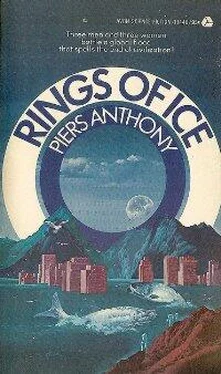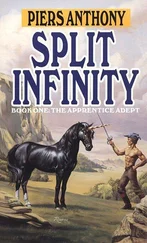The motor coughed, making her jump, for she was almost astride the tail pipe. Gordon had worked his magic once more and they were about to be on their way— again.
Inside, all was not well. They were low on food, water, and gasoline.
“We’ve got to get more,” Gus said.
“There isn’t any more,” Thatch replied, sounding querulous. That was another thing: how had this Gus/Karen thing affected Thatch? “No stores or stations will be open in this rain—and we don’t have enough money.”
“Don’t give me that!” Gus snapped. “I tell you we need supplies, not excuses—and within the hour!”
Just like that, Zena thought. Gus was true to form.
“It wouldn’t be right to—” Thatch was saying.
“You think anybody’s going to care what we take—after it’s all underwater?” Gus demanded. “We’d better salvage what we can!”
“He has a point,” Gordon said. “I don’t approve of theft, but this is hardly a typical circumstance.”
Thatch nodded regretfully. “I suppose not.”
“Aren’t you making a big assumption?” Karen asked. “Pretty soon this rain will stop, and—”
“No. It’ll never stop,” Gus said. “Not till all this is way underneath. That’s why we’re driving so hard for the mountains.”
The motor was running smoothly now, and Gordon came inside. “Thatch and Zena and I have to collapse,” he said. “Gus’d better drive.”
Thatch began to shake his head, but Karen cut him off. “I know how to drive.”
“Women don’t—” Gus began.
“Oh, it will be quite safe,” Karen said, “with you to help me.”
Gus tried to protest, but she led him to the front. He seemed to be unable to resist her suggestion.
Zena looked at Thatch, but he was already lying on the dinette bed. Then her eye caught Gordon’s—and he winked.
Karen could make Gus go along because she had taken the trouble to show him what she could do for him. Smart, smart! Maybe Gordon had suggested the notion to her.
Zena quelled another surge of nausea and flopped wetly on the back couch.
When she woke, it was because the bus was stopping. Gloria was on the parallel couch, still asleep. Once more Zena considered that classic feminine face, that long blonde hair, that artificially full bosom. No matter how tired he was, Gordon always took time to convert to Gloria for repose!
Why didn’t this inversion upset her the way Karen’s antics had? Zena didn’t know. “Sleep on, sleeping beauty,” she murmured, and strode forward.
Thatch, too, remained asleep. Gus and Karen were stretching. “Filling station,” Gus said. “Should be gas here—and we’re down to under five gallons. Which is not much for a bus this size. Maybe food here too.”
“I hope so!” Karen said fervently. She did not look well, but Zena could not tell what was wrong with her. She wished she knew more about drugs.
“We can siphon gas,” Gus said, “if we can find a tube.”
“Or just pump it out of the pump,” Karen said.
“Hey, yes!” he agreed, startled. “I’m thinking too much like a criminal.”
At least he felt some twinge of guilt, Zena thought. But so it had to be. No one would have any use for it after this group passed. The sea was rising.
“You look,” Gus said. “It’s still raining.”
“Sorry, I forgot,” Zena said sharply. But as usual, the irony was wasted on him.
She went out, hunching momentarily as the water soaked her once more. The rain was colder now! If she didn’t catch pneumonia…
Karen followed her, hunching similarly. “Zena, listen,” she called over the noise. “I want to explain—”
“You don’t have to explain anything to me.”
“You told me at the outset how the men expected—”
“And you told me you were married.”
“My husband’s in California! Do you think I’ll ever see him again?”
That stopped her. California was as good as Mars, as far as accessibility went. If he were not dead already, he might as well be. Karen, therefore, was being practical. Still, that drug addiction—“We have gas and food to find,” Zena said, moving on.
“Yes, of course! But it is important to encourage everyone to participate—”
Zena opened the glass door and stepped inside. It was true that Karen had gotten Gus to contribute a little more to group survival than he might have otherwise, but that hardly seemed to justify the method.
The place had been ransacked. The floor was covered with debris, and the shelves were empty.
“If it’s this bad in a filling station,” Zena asked rhetorically, “how bad is it going to be in a supermarket?”
“They missed the candy machine!” Karen said. “Come on!”
“I never broke into a machine in my life.”
“You may not need candy, but believe me, I do!” Karen found a large screwdriver and began prying.
Disgusted, Zena walked out. She checked the pumps in front, but they appeared to be out of gas. It was evident that many people had been alert to the spoils of anarchy— and much faster to act. But they had been hurried, no doubt eager to get home; a careful search should turn up more than candy bars.
There was a noise, not the rain. Zena looked around before remembering that Karen was at work inside the station, probably hammering on the machine. No sense getting jumpy about sounds.
There were elevated tanks behind. Did they hold reserves of gasoline? Or something else? But they sounded hollow under the beat of rains: indication enough.
She came back around the side. A door said MEN. That reminded her: they needed water to flush the toilet—and water to drink, too. They could always collect rain, but if there were running water here for the bus’s tanks, that would be easier.
She walked around to the WOMEN door and tried the handle. The door was locked.
There was a banging from inside.
Karen?
Zena walked to the front and peered through the glass. Karen was still working on the machine.
Back at the WOMEN door, Zena knocked. “Are you all right?” she called, feeling a bit foolish.
“Locked in!” a childish treble replied. “Help!”
“You can open it,” Zena said. “Pull out the dingus and turn the handle.”
“I can’t!”
“Just a minute.” Zena looked about. After a moment’s search she found a curved crowbar lying on the ground, apparently thrown there by the prior vandals. She picked it up and inserted the sharp end into the crack of the door. Then it became obvious why the lock would not release: the moisture had made it swell tight.
Zena threw her body into it, not concerned about damage. There was a lot of leverage in a crowbar. Something cracked, and she was able to jam the point in deeper. Another heave, and the door pried out, its lock ruined.
A young girl, thirteen or fourteen, was inside. She was dry and rather pretty.
Then a yellow animal attacked. Zena fended it off, batting it away. Her leg stung from a scratch.
“Dust Devil!” the girl exclaimed, stumbling.
It was a little cat. It withdrew, snarling.
The girl swept her hand toward it. She caught the hind end of the cat, and picked up the animal, hauling it into the air by its back legs. “This is Dust Devil,” she said. “He’s not a bad cat, really. He just doesn’t like people.”
“If that’s how you treat him, no wonder!”
“He understands about me. Who are you?”
“Zena Emers. You?”
“What?”
“Who are you?”
“Oh! Floy. Floy Sanford. And this is Dust Devil. He—”
“Yes, I know,” Zena said. “What are you doing in here?”
“Well, I came to—you know—and when I got out, they were gone. I didn’t know where to go, so I didn’t go anywhere. And then the door stuck.”
Читать дальше










